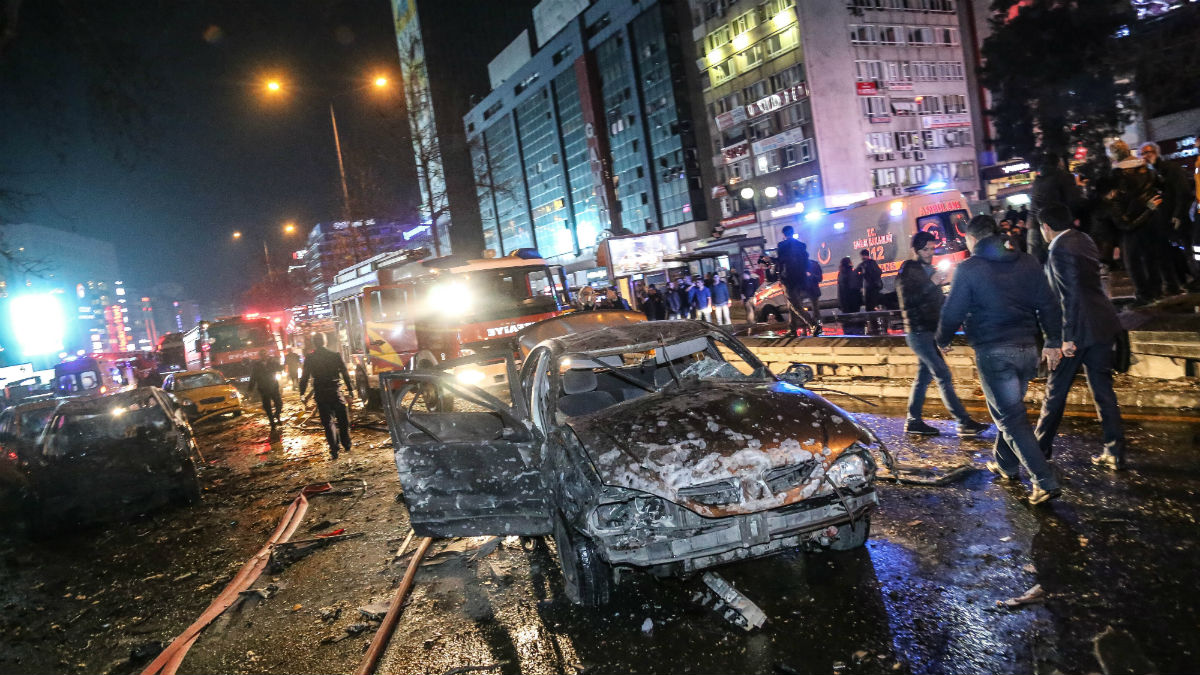Ankara bomber was member of militant rebel group, says official
Kurdistan Workers' Party blamed for suicide car bombings that killed at least 37 people

A free daily email with the biggest news stories of the day – and the best features from TheWeek.com
You are now subscribed
Your newsletter sign-up was successful
One of the suicide car bombers who killed at least 37 people in Ankara yesterday is thought to have been a female militant from the Kurdistan Workers' Party (PKK), a senior Turkish government official has claimed.
The attack took place in Guven Park in the Kizilay district, a transport hub that is home to many administrative buildings, including the justice and interior ministries. Several vehicles were reduced to burnt-out wrecks, including a bus, and 125 people were being treated in hospitals for injuries.
No group has yet claimed responsibility, but anonymous Turkish officials have pointed the finger at militant rebels. "According to initial findings, it seems that this attack has been carried out either by the PKK or an affiliated organisation," one security official told Reuters.
The Week
Escape your echo chamber. Get the facts behind the news, plus analysis from multiple perspectives.

Sign up for The Week's Free Newsletters
From our morning news briefing to a weekly Good News Newsletter, get the best of The Week delivered directly to your inbox.
From our morning news briefing to a weekly Good News Newsletter, get the best of The Week delivered directly to your inbox.
A senior government official also told news agencies that two terrorists were believed to be responsible, one of them a female PKK member. She is said to have been born in 1992 and came from Kars, eastern Turkey.
President Recep Tayyip Erdogan has condemned the attacks and sought to reassure Turks. "Our people should not worry," he said. "The struggle against terrorism will for certain end in success and terrorism will be brought to its knees."
He suggested that militants were targeting civilians because they were losing their struggle against the Turkish army.
Terror attacks "do not diminish our will to fight against terror, but further boost it", he said.
A free daily email with the biggest news stories of the day – and the best features from TheWeek.com
The attack is the third in the city in less than six months. Three weeks ago, a deadly blast targeting military personnel claimed the lives of 29 people.
Turkey is now facing multiple security threats, says the BBC's Mark Lowen. "The country that was the stable corner of the Middle East and the West's crucial ally in a volatile region is now at a dangerous moment."
-
 Crisis in Cuba: a ‘golden opportunity’ for Washington?
Crisis in Cuba: a ‘golden opportunity’ for Washington?Talking Point The Trump administration is applying the pressure, and with Latin America swinging to the right, Havana is becoming more ‘politically isolated’
-
 5 thoroughly redacted cartoons about Pam Bondi protecting predators
5 thoroughly redacted cartoons about Pam Bondi protecting predatorsCartoons Artists take on the real victim, types of protection, and more
-
 Palestine Action and the trouble with defining terrorism
Palestine Action and the trouble with defining terrorismIn the Spotlight The issues with proscribing the group ‘became apparent as soon as the police began putting it into practice’
-
 Epstein files topple law CEO, roil UK government
Epstein files topple law CEO, roil UK governmentSpeed Read Peter Mandelson, Britain’s former ambassador to the US, is caught up in the scandal
-
 Iran and US prepare to meet after skirmishes
Iran and US prepare to meet after skirmishesSpeed Read The incident comes amid heightened tensions in the Middle East
-
 Israel retrieves final hostage’s body from Gaza
Israel retrieves final hostage’s body from GazaSpeed Read The 24-year-old police officer was killed during the initial Hamas attack
-
 China’s Xi targets top general in growing purge
China’s Xi targets top general in growing purgeSpeed Read Zhang Youxia is being investigated over ‘grave violations’ of the law
-
 Panama and Canada are negotiating over a crucial copper mine
Panama and Canada are negotiating over a crucial copper mineIn the Spotlight Panama is set to make a final decision on the mine this summer
-
 Why Greenland’s natural resources are nearly impossible to mine
Why Greenland’s natural resources are nearly impossible to mineThe Explainer The country’s natural landscape makes the task extremely difficult
-
 Iran cuts internet as protests escalate
Iran cuts internet as protests escalateSpeed Reada Government buildings across the country have been set on fire
-
 US nabs ‘shadow’ tanker claimed by Russia
US nabs ‘shadow’ tanker claimed by RussiaSpeed Read The ship was one of two vessels seized by the US military